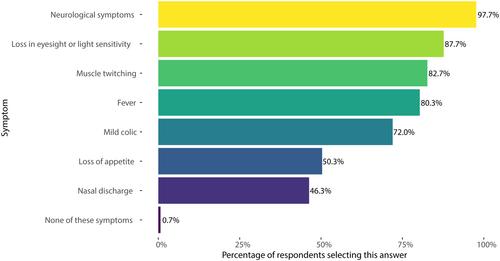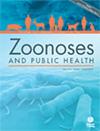Orthoflavivirus surveillance in the Netherlands: Insights from a serosurvey in horses & dogs and a questionnaire among horse owners
Abstract
Aims
Zoonotic arboviruses (arthropod-borne) of the Orthoflavivirus genus, such as West Nile virus (WNV), Usutu virus (USUV) and Tick-borne encephalitis virus (TBEV), are emerging in Northwestern Europe and pose a threat to both human and animal health. In the Netherlands, passive symptomatic surveillance (notification of clinical cases) in horses is one of the main pillars for the early detection of WNV. For such passive surveillance to work properly, horse owners and veterinarians need to recognize symptoms and report suspected cases to the authorities. Currently, little is known about the seroprevalence of orthoflaviviruses in domestic animals in the Netherlands. Therefore, this study aims at identifying the seroprevalence of WNV and USUV in horses and dogs in the Netherlands. Additionally, this study seeks to evaluate the knowledge and perceptions of Dutch horse owners towards mosquito-borne viruses.
Methods and Results
A cross-sectional serosurvey in horses and dogs was conducted between May 2021 and May 2022. Serum samples were screened using an ELISA and doubtful and positive samples were confirmed by Virus Neutralization Tests for WNV, USUV and TBEV. A validated questionnaire, the MosquitoWise survey, was used to assess the knowledge and perceptions of Dutch horse owners towards mosquito-borne viruses between July and October 2022. The serosurvey revealed a low seroprevalence for WNV in horses and no WNV-positive dogs were found. Similarly, a low USUV seroprevalence was found in dogs. The MosquitoWise survey revealed a high knowledge level for horse owners and high awareness of WNV vaccination but a more limited intent to vaccinate.
Conclusions
The low seroprevalences of WNV and USUV indicate many dogs and horses remain susceptible, offering opportunities for trend analysis and surveillance. However, despite multiple recent detections of WNV, USUV, and TBEV in humans, the role of dogs and horses in early detection of human cases is debatable. High awareness among horse owners and the absence of detected equine WNV cases highlight this uncertainty. Continued surveillance is crucial for detecting increased virus circulation and protecting both animal and human health.


 求助内容:
求助内容: 应助结果提醒方式:
应助结果提醒方式:


